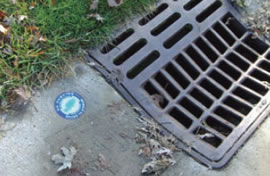Stormwater Pollution
Protecting yourself and your family is equally important as protecting the environment. Follow these helpful tips to keep your family safe and healthy when near urban waterways:
-
Pay attention to combined sewer overflow (CSO) warning signs posted by Citizens.
-
Prevent your children and pets from making contact with urban streams/waterways.
-
Teach children to stay away from flooded parks, greenways, yards, parking lots and streets. Floodwaters in urban areas are both dangerous and unsanitary.
-
Always wash your hands after contacting water in urban streams, especially before eating, drinking, smoking or preparing food.
-
Use a waterless hand sanitizer at outings that occur near urban streams.
 Stormwater pollution is a problem. Any substance, pollutants or contaminants, stormwater runoff picks up, will ultimately flow untreated into our rivers, lakes and streams.
Stormwater pollution is a problem. Any substance, pollutants or contaminants, stormwater runoff picks up, will ultimately flow untreated into our rivers, lakes and streams.
Fortunately, there are several actions you can take to minimize stormwater pollution. Practicing these healthy household habits can help you keep common pollutants off the ground and out of stormwater.
Vehicle and Garage
-
Use a commercial car wash or wash your car on a lawn or other unpaved surface to minimize the amount of dirty, soapy water flowing into the storm drain and eventually into your local body of water.
-
Check your car, boat, motorcycle and other machinery and equipment for leaks and spills. Make repairs as soon as possible. Clean up spilled fluids with an absorbent material like kitty litter or sand, and don't rinse the spills into a nearby storm drain. Remember to properly dispose of the absorbent material.
-
Recycle used oil and other automotive fluids at participating service stations. Don't dump these chemicals down the storm drain or dispose of them in your trash.
Lawn and Garden
-
Use pesticides and fertilizers sparingly. When use is necessary, use these chemicals in the recommended amounts. Avoid application if the forecast calls for rain; otherwise, these chemicals will be washed into your local stream.
-
Select native plants and grasses that are drought and pest resistant. Native plants require less water, fertilizer and pesticides.
-
Sweep up yard debris, rather than hosing down areas. Compost or recycle yard waste when possible.
-
Don't overwater your lawn. Water during the cool times of the day and don't let water flow into the storm drain.
-
Cover piles of dirt and mulch being used in landscaping projects to prevent these pollutants from blowing or washing off your yard and into local bodies of water.
-
Eliminate bare spots in your yard by planting trees, flowers, or shrubs. This will prevent soil erosion.
-
Create a rain garden to divert stormwater away from your home.
Home Repair and Improvement
-
Before beginning an outdoor project, locate the nearest storm drains and protect them from debris and other materials.
-
Sweep up and properly dispose of construction debris such as concrete and mortar.
-
Use hazardous substances like paints, solvents and cleaners in the smallest amounts possible, and follow the directions on the label. Clean up spills immediately and dispose of the waste safely. Store substances properly to avoid leaks and spills.
-
Purchase and use nontoxic, biodegradable, recycled and recyclable products whenever possible.
-
Clean paint brushes in a sink, not outdoors. Filter and reuse paint thinner when using oil-based paints. Properly dispose of excess paints through a household hazardous waste collection program, or donate unused paint to local organizations.
-
Reduce the amount of paved area and increase the amount of vegetated area in your yard. Use native plants in your landscaping to reduce the need for watering during dry periods. Consider directing downspouts away from paved surfaces onto lawns and other measures to increase infiltration and reduce polluted runoff.
-
Disconnect downspouts and sump pumps from sewers to prevent clean water from using up our sewers' capacity.
-
Install a green roof to help slow the flow and improve the water quality of water coming off of your roof during rain events.
-
Use non-toxic household cleaning products. When cleaning products are washed down drains, the toxic chemicals are sent to a wastewater treatment plant. Many of these chemicals cannot be treated and end up in our waterways.
Pet Care
-
When walking your pet, remember to pick up the waste and dispose of it properly. Flushing pet waste is the best disposal method. Leaving pet waste on the ground increases public health risks by allowing harmful bacteria and nutrients to wash into the storm drain and eventually into local bodies of water.
Swimming Pool and Spa
-
Drain your swimming pool only when a test kit does not detect chlorine levels.
-
Whenever possible, drain your pool or spa into the sanitary wastewater (sewer) system.
-
Properly store pool and spa chemicals to prevent leaks and spills, preferably in a covered area to avoid exposure to stormwater.
Septic System Use and Maintenance
-
Have your septic system inspected by a professional at least every 3 years, and have the septic tank pumped as necessary (usually every 3 to 5 years).
-
Care for the septic system drain field by not driving or parking vehicles on it. Plant only grass over and near the drain field to avoid damage from roots.
-
Flush responsibly. Flushing household chemicals like paint, pesticides, oi, and antifreeze can destroy the biological treatment taking place in the system. Other items, such as diapers, paper towels and cat litter, can clog the septic system and potentially damage components.

